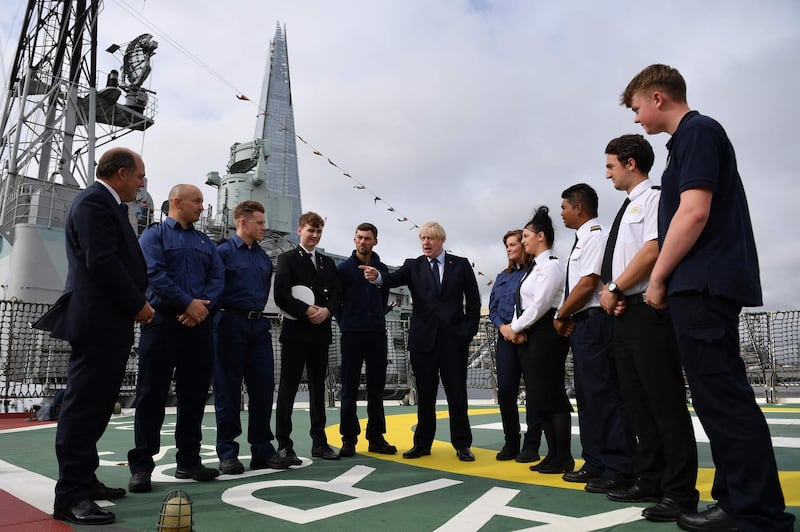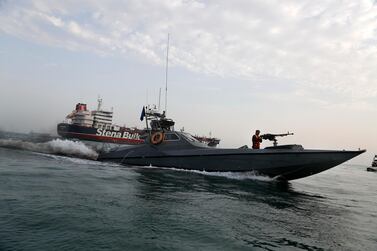In an attempt to revive Britain’s floundering shipyards, Prime Minister Boris Johnson awarded a UK company a £1.3 billion (Dh5.89bn) contract to build five new frigates.
The announcement comes amid rising tension in the Strait of Hormuz that has stretched the Royal Navy’s ability to defend oil tankers under threat from Iran.
The contract to design new Type 31 frigates was awarded to Babcock International on Thursday.
The frigates will be assembled at its facility in Rosyth, Scotland, and the programme will support more than 2,500 jobs across the Britain.
Mr Johnson has pledged to reinvigorate the country’s all but dormant shipyards.
It is expected that the move will provide up to six years work at the historic Harland and Wolff shipyard in Belfast – famed for building the Titanic – which has been under threat and went into administration in August.
The Royal Navy has recently been forced to send three destroyers to the Gulf, HMS Montrose, HMS Defender and HMS Kent, to escort merchant naval ships and protect freedom of navigation.
Escalating tension also led to HMS Montrose being caught up in more than 115 confrontations with Iran's Islamic Revolutionary Guard Corps since July.
The design work on the new vessels is due to start immediately. Babcock’s Arrowhead 140 design triumphed over rival bids from BAE Systems and Atlas Elektronik UK.
“Arrowhead 140 is a modern warship that will meet the maritime threats of today and tomorrow,” Babcock chief executive Archie Bethel said.
“It provides a flexible, adaptable platform that delivers value for money and supports the UK’s National Shipbuilding Strategy.”
The government will buy at least five of the frigates and has said the first ship is scheduled to be in the water by 2023.
Babcock said detailed design work would start immediately, with manufacturing beginning in 2021 and finishing in 2027.
The ships will have an average production cost of £250 million pounds a ship.
The government has committed to keeping up a fleet of at least 19 frigates and destroyers with the aim of growing the fleet in the 2030s. Type 31 frigates will replace Type 23 ships.
“The UK is an outward-looking island nation, and we need a shipbuilding industry and Royal Navy that reflect the importance of the seas to our security and prosperity,” Mr Johnson said.
“I am convinced that by working together we will see a renaissance in this industry which is so much part of our island story – so let’s bring shipbuilding home.”
Britain is building patrol vessels and new Type 26 frigates at BAE Systems’ Govan shipyard on the Clyde in Glasgow.
But the country’s shipbuilding industry has suffered a catastrophic decline in the past 40 years, with shipyards in places from Sunderland to Portsmouth closing.







